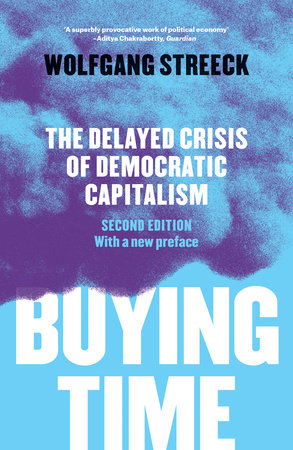Praise for Buying Time
“A superbly provocative work of political economy.”
—Aditya Chakrabortty, Guardian
“For anyone interested in understanding the bind democracies are in, this is a vital if sobering book which has a troubling, if convincing, conclusion.”
—Matthew Lawrence, Prospect
“Is electoral democracy compatible with the type of economic policies the EU—backed at a distance by Washington and Wall Street—wants to impose? This is the question posed by the Cologne-based sociologist Wolfgang Streeck in Buying Time, a book that is provoking debate in Germany. Streeck argues that since Western economic growth rates began falling in the 1970s, it has been increasingly hard for politicians to square the requirements of profitability and electoral success; attempts to do so (‘buying time’) have resulted in public spending deficits and private debt. The crisis has brought the conflict of interests between the financial markets and the popular will to a head: investors drive up bond yields at the ‘risk’ of an election. The outcome in Europe will be either one or the other, capitalist or democratic, Streeck argues; given the balance of forces, the former appears most likely to prevail. Citizens will have nothing at their disposal but words—and cobblestones.”
—Susan Watkins, London Review of Books
“Streeck has here provided an excellent and challenging account of the current state of relations between capitalism and democracy. His concept of a state whose democratic responsibilities to voters are required systematically to be shared with and often trumped by those to creditors takes us a major step forward.”
—Colin Crouch, author of Coping With Post-Democracy
“Argues that ever since the 1970s, governments in the west have been ‘buying time’ for the existing social and political order … a timely corrective.”
— Larry Elliott, Guardian
“In its best parts—when political passion connects with critical exposition of the facts and incisive argument—Streeck’s sweeping and empirically founded inquiry reminds one of Karl Marx’s Eighteenth Brumaire of Louis Bonaparte.”
— Jürgen Habermas
“Logically organized, well argued, scholarly informed, and rich in theoretical references and statistical series covering nearly six decades.”
— Robert Boyer, ILR Review
“[Buying Time] reinvigorates the tradition to reflect on the inherent friction between democracy and capitalism in broad historical analyses … Without any doubt, Buying Time developes a fascinating and highly compelling narrative of the delayed crisis of capitalism. [One of the] must reads for everyone interested in the Eurozone crisis and critique of capitalism more broadly—with an academic background or as an interested citizen.”
—Elias Steinhilper and Haris Malamidis, European Political Science



